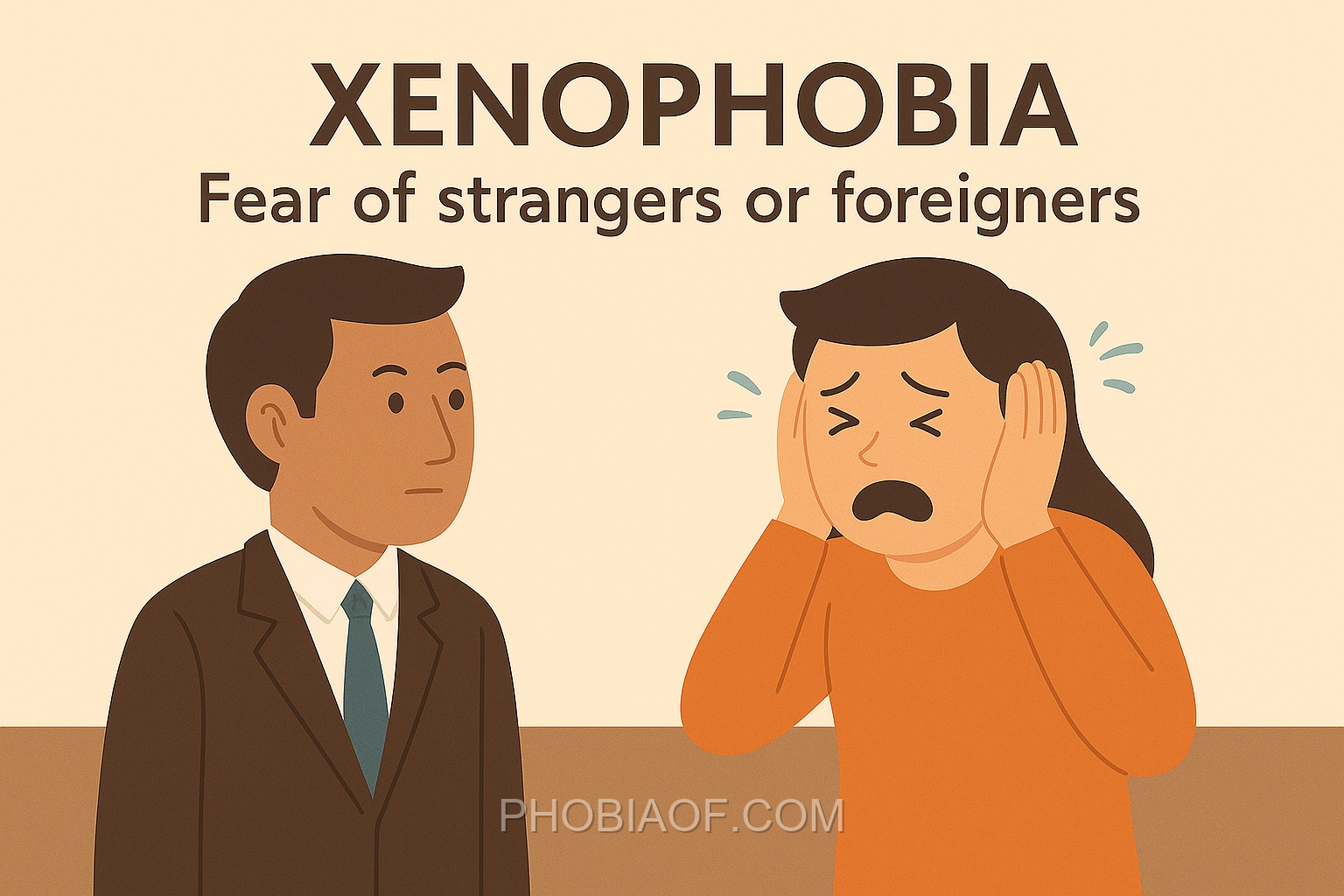Have you ever felt uneasy around people who are different from you, simply because they come from another place or culture? This feeling might stem from a concept known as xenophobia.
Xenophobia is a term used to describe the fear or dislike of strangers or foreigners. It originates from the Greek words ‘xenos’, meaning “stranger” or “foreigner,” and ‘phobos’, meaning “fear.” In everyday language, xenophobia refers to a negative attitude towards people who are perceived as outsiders or who are different from oneself.
This fear can manifest in various ways, from mild discomfort to outright hostility, and it impacts people and societies in significant ways. Here are some general effects of xenophobia:
- Social Division: Xenophobia can create a divide between different groups of people, leading to segregation and a lack of understanding.
- Discrimination: Those who experience xenophobia may be subject to unfair treatment based on their nationality, ethnicity, or cultural background.
- Psychological Impact: For individuals who are targeted, xenophobia can lead to stress, anxiety, and a feeling of alienation.
- Economic Consequences: Communities may suffer economically if xenophobia leads to a lack of cooperation or if it drives away potential contributors to society.
Understanding xenophobia is crucial in fostering compassion and promoting inclusivity, helping to build bridges between diverse communities.
Causes of Xenophobia
Xenophobia, the fear or dislike of people from other countries or cultures, can arise from various causes. Understanding these causes is crucial for addressing and mitigating its impact on individuals and societies.
Several factors may contribute to the development of xenophobia, including:
- Genetic Predisposition: Some researchers suggest that genetic factors can influence a person’s susceptibility to fear-related responses. While no specific “xenophobia gene” exists, individuals with a family history of anxiety disorders may be more prone to developing phobic reactions, including xenophobia.
- Traumatic Experiences: Negative experiences involving individuals from other cultures can lead to the development of xenophobic attitudes. For example, someone who has experienced crime or conflict involving foreigners may generalize this fear to all individuals from that group.
- Learned Behavior: Xenophobia can be a learned behavior, often passed down from parents, peers, or society. If someone grows up in an environment where negative stereotypes and prejudices against certain groups are prevalent, they may adopt these attitudes.
- Social and Cultural Factors: Societal influences, such as media portrayal of foreigners or political rhetoric, can shape perceptions and fears. When immigrants or other groups are depicted negatively, it can reinforce xenophobic attitudes.
- Psychological Factors: Fear of the unknown or unfamiliar is a natural human response. People may experience anxiety when faced with cultural differences, leading to xenophobia if not managed properly.
Interestingly, some theories suggest that xenophobia may have evolutionary roots. Historically, humans lived in small, tight-knit communities where outsiders could pose threats to resources or safety. This could have led to a natural wariness of strangers, which may manifest as xenophobia in modern contexts.
Understanding these causes helps in devising strategies to combat xenophobia, such as promoting cultural exchange, education, and fostering empathy. By addressing the root causes, societies can work towards reducing fear and building more inclusive communities.
Symptoms of Xenophobia
Xenophobia, an intense fear or aversion to people perceived as foreign or unfamiliar, often manifests through a variety of symptoms. Individuals experiencing this phobia may feel overwhelming fear or anxiety in situations involving perceived outsiders. Here are some common symptoms:
- Intense Fear or Anxiety: A profound sense of fear or anxiety when encountering or thinking about people from different cultural or ethnic backgrounds.
- Panic Attacks: Sudden episodes of intense fear that trigger severe physical reactions when confronted with the source of the fear.
- Sweating: Excessive perspiration, often occurring alongside feelings of fear or anxiety.
- Rapid Heartbeat: An increased heart rate, which may be accompanied by palpitations, especially in anxiety-provoking situations.
- Trembling or Shaking: Visible or internal shaking often accompanies acute anxiety episodes.
- Avoidance of Triggers: Deliberately steering clear of situations, places, or people that might trigger the phobia.
- Overwhelming Dread: A constant sense of impending doom or extreme worry about encountering foreigners or unfamiliar cultural practices.
- Hypervigilance: An increased state of alertness and scanning for perceived threats related to the phobia.
- Emotional Distress: High levels of emotional turmoil, such as sadness or anger, when confronted with the phobic stimulus.
- Social Withdrawal: Avoiding social situations or isolating oneself to prevent interaction with people perceived as foreign.
If xenophobia becomes severe, these symptoms can significantly interfere with daily life, impacting social interactions, professional obligations, and overall well-being.
Treatment for Fear of Strangers or Foreigners
Overcoming xenophobia, the fear of strangers or foreigners, is entirely possible with the right treatment and coping strategies. If this phobia is interfering with your life, it’s important to know that you are not alone, and there are effective ways to manage and treat it over time. Let’s explore some of the proven therapies and techniques that can help you on your journey to overcoming this fear.
Proven Therapies for Xenophobia
- Exposure Therapy: This method involves gradually facing the fear in a controlled and safe environment. By slowly increasing exposure to situations involving strangers or foreigners, you can diminish the fear response over time. A trained therapist will guide you through this process, ensuring that it is done at a pace that is manageable for you.
- Cognitive-Behavioral Therapy (CBT): CBT is a well-established therapy that helps in changing the fearful thoughts that contribute to xenophobia. By identifying and challenging irrational beliefs, you can develop a more balanced and less fearful perspective. CBT often involves learning new coping mechanisms and strategies to manage anxiety.
- Counseling: Speaking with a counselor can provide a safe space to explore the underlying causes of your fear. Counseling can help in understanding your emotions and developing healthier ways to cope with situations that trigger xenophobia.
Complementary Self-Help Techniques
- Relaxation Exercises: Techniques such as deep breathing, progressive muscle relaxation, and guided imagery can help reduce anxiety and promote a sense of calm.
- Meditation: Regular meditation practice can enhance self-awareness and reduce stress, making it easier to manage fearful thoughts and reactions.
- Support Groups: Joining a support group can provide a sense of community and shared understanding. Hearing others’ experiences and strategies can be incredibly encouraging and offer new insights.
In some severe cases, medication such as anti-anxiety drugs may be considered. However, the focus should remain on therapy and developing effective coping skills to manage the phobia.
If xenophobia is significantly impacting your life, I encourage you to seek professional help. With the right support and treatment, you can overcome this fear and lead a more fulfilling life. Remember, it’s a journey, and seeking help is a courageous first step.
Conclusion
Understanding xenophobia, the fear of strangers or foreigners, begins with recognizing its causes and symptoms. By identifying these elements, individuals can gain insight into their own experiences or those of others, paving the way for effective coping strategies and interventions. Knowledge truly is power; being informed equips you with the tools to confront and manage this fear.
It’s important to remember that overcoming or managing phobias is achievable. Many people have successfully navigated their way through similar challenges with the right support and resources. Whether it’s through self-help strategies, therapy, or medical consultation, there are numerous avenues available for assistance.
Take the first step towards managing your xenophobia by reaching out for support. Consider speaking with a therapist or a healthcare professional who can guide you through this journey. With time, patience, and proper help, you can work towards living a life less burdened by fear.
Remember, you are not alone, and there is hope. Embrace the possibility of growth and healing, knowing that understanding and support are within your reach.






